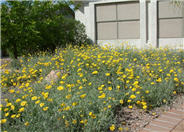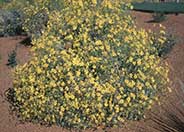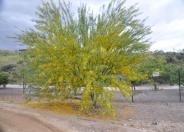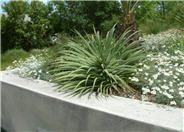
Common name:Desert Marigold
Botanical name:Baileya multiradiata
Fast growing perennial reaches 1' x 1'. Soft silvery gray leaves. Bright yellow daisy like flowers appear year round. This undemanding plant reseeds easily. Accepts reflected sun. Be careful not to overwater. Native to southwest U.S. and northern Mexico.

Common name:Brittlebush, Desert Encelia
Botanical name:Encelia farinosa
This deciduous mounding shrub typically has gray leaves that can reach 3' tall and wide. However, the leaves will turn white in drought conditions. Bright yellow 1" wide daisies appear in spring and summer. There is rapid growth following rain but this shrub is short-lived. Individual plants will reseed to repopulate. It does well in hot areas but cannot tolerate clay soils due to root rot. It will become overgrown and fragile if overwatered. It will suffer frost damage at 25 degrees F.

Common name:Desert Museum Palo Verde
Botanical name:Parkinsonia 'Desert Museum'
Striking, generally multi-trunked tree to 25' tall and wide. Three-way cross between P. aculeata, P. microphyllum, and P. floridum. Plants are thornless, and produce abundant clusters of yellow flowers in the spring.

Common name:Candelabrum Agave, Spider Agave
Botanical name:Agave bracteosa
One of the most attractive smaller agaves, sometimes clump forming. Unarmed leaves make for a good container plant. Best in part sun to light shade. Slender recurving narrow green leaves resembles a spider. Aloe-like flowers are white-orange This agave is one of only a few, that does not die after flowering. The bloom spike is 3' of densely packed cream colored flowers. Is more moisture tolerant than others, needing good drainage. Native on limestone ledges.
Designer: Carol Stuttard, Homeowner
Photographer: GardenSoft
Practice grass-cycling by leaving short grass clippings on lawns after mowing, so that nutrients and organic matter are returned to the soil.
Apply a layer of mulch around plants to reduce moisture loss.
Choose organic mulches, such as shredded bark, compost or aged sawdust.
Attract, or buy beneficial insects such as ladybugs and lacewings to control pest outbreaks in your garden.